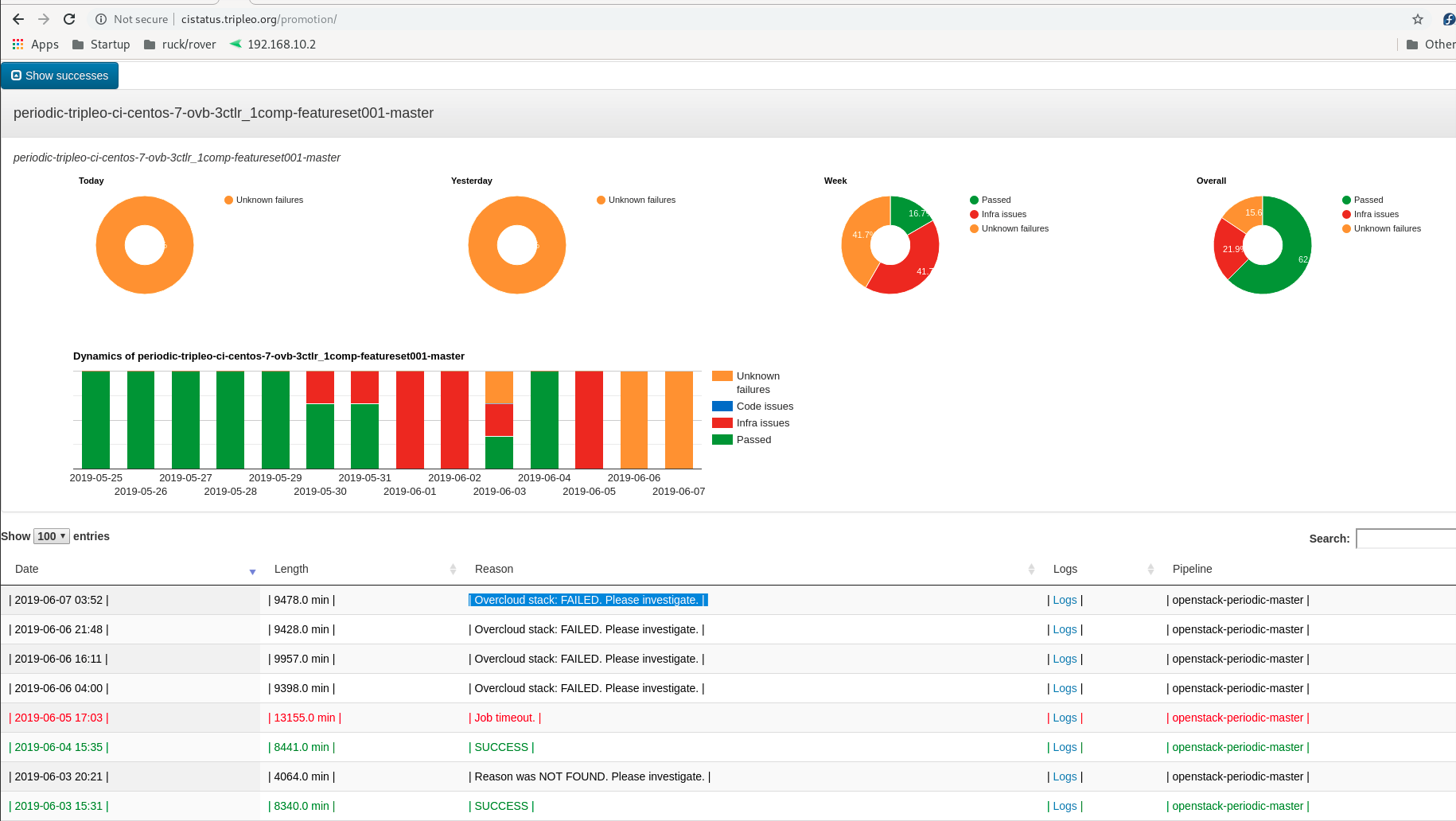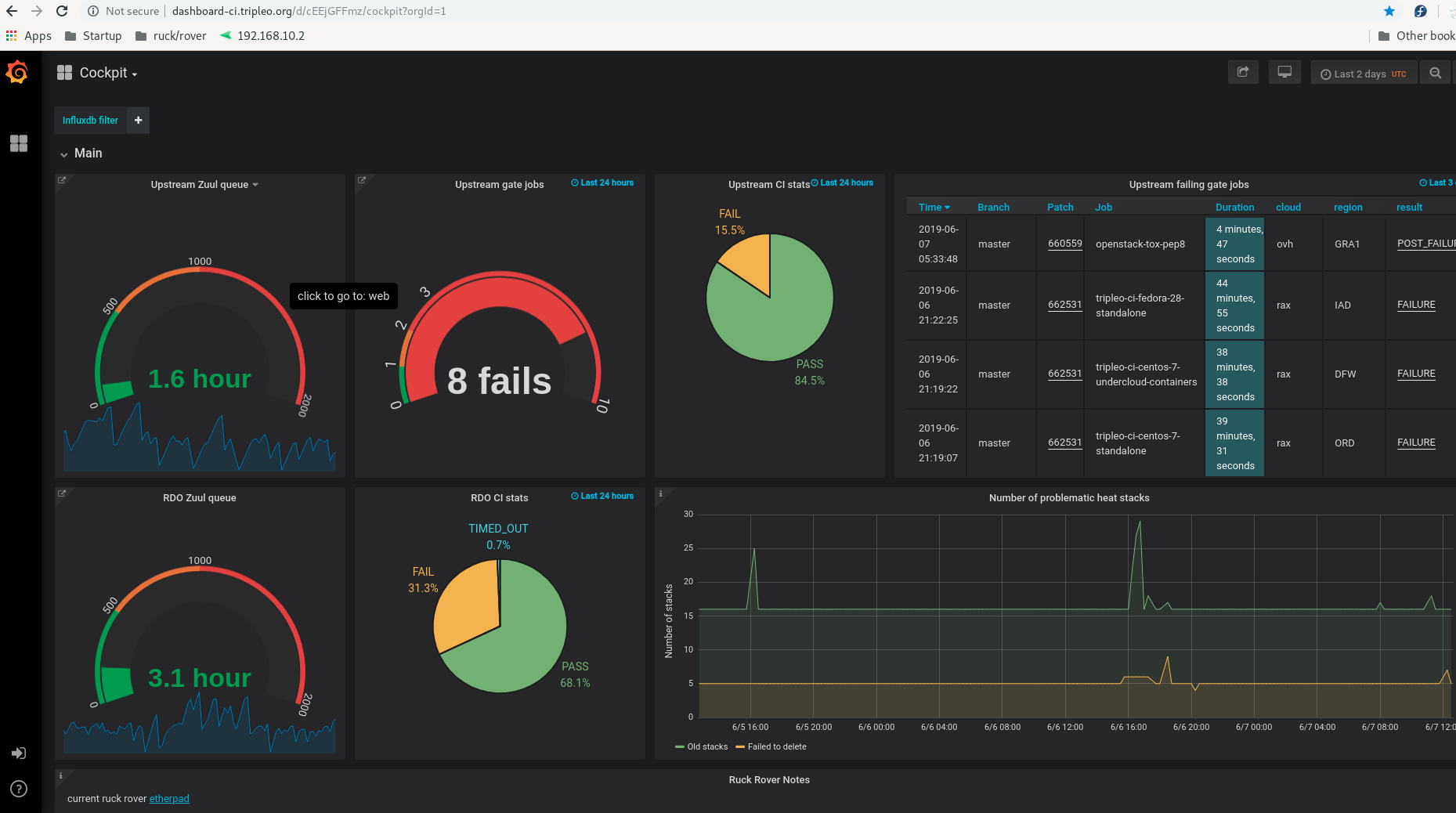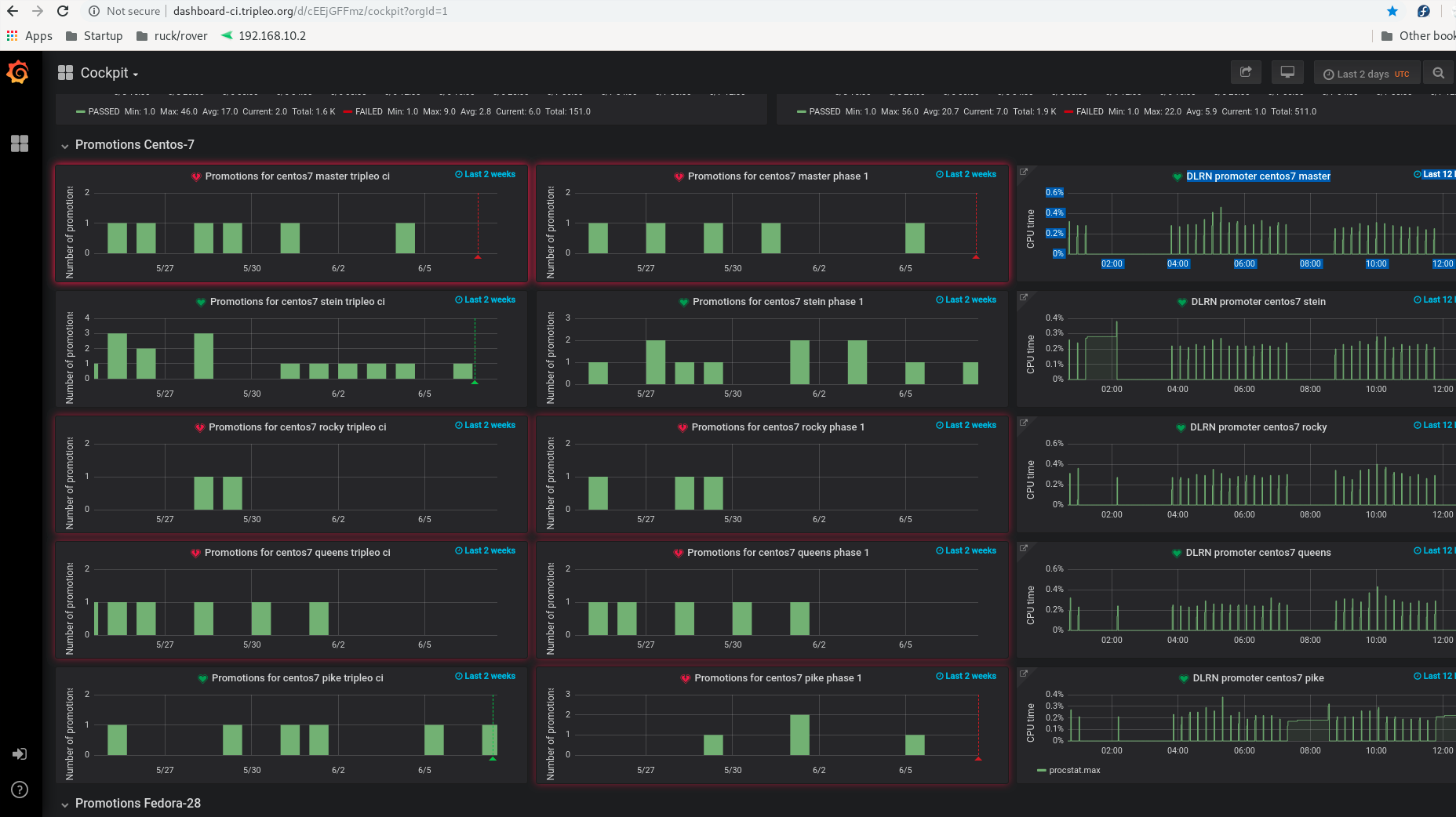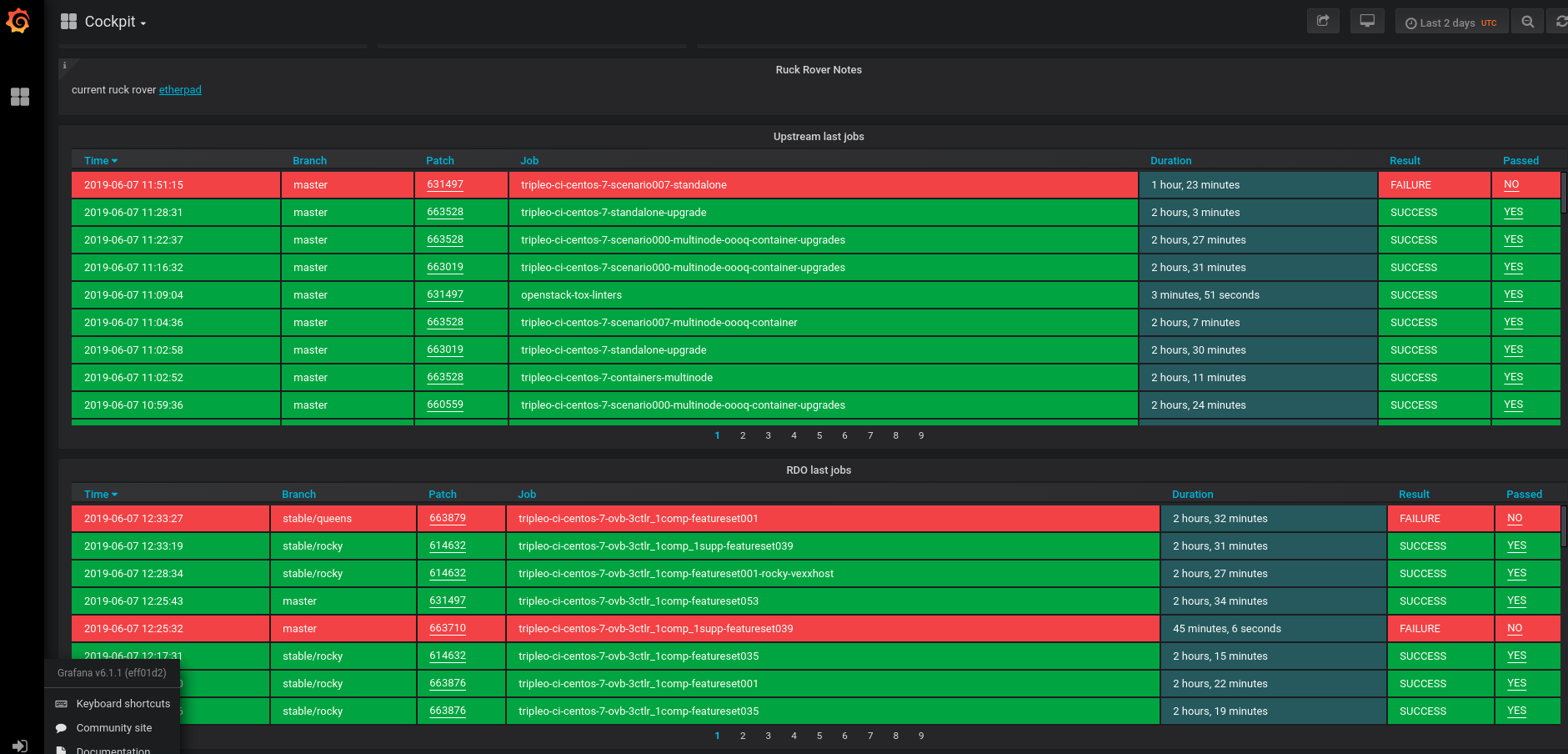TripleO CI ruck|rover primer¶
The tripleo-squad divides their work across 3 week sprints. During sprint planning 2 members of the team are nominated as the ‘ruck’ and ‘rover’. You can easily identify these unfortunate souls in OFTC #oooq with “ruck” or “rover” in their irc nick.
In short the “ruck” and “rover” are tasked with keeping the lights on for a given TripleO CI sprint. This means:
ensuring gate queues are green to keep TripleO patches merging.
ensuring promotion jobs are green to keep TripleO up to date with the rest of OpenStack and everything else that isn’t TripleO! Target is bugs filed + escalated + fixed for promotion at least once a week.
The “ruck|rover” concept adopted by Tripleo CI are taken from Australian Rules Football. The ruck monitors ‘the queue’ and files bugs, and the rover picks up those bugs and runs with them until they’re fixed.
This document is a primer for anyone new to the TripleO CI squad or otherwise interested in how the ruck|rover of the TripleO CI squad operate. See the CI Team Structure document for general information about how the (rest of the) TripleO CI team is organised and operates in a given sprint.
Ruck¶
The ruck monitors the various jobs across the various tripleo related repos both upstream tripleo-ci and rdo-infra jobs and periodics for promotions. The grafana dashboard at http://cockpit-ci.tripleo.org/ is one of the tools used by the ruck to monitor jobs (and many other things, more info on grafana below).
Any new issues are triaged by collecting logs from multiple instances of the error (i.e. same error in different jobs or different runs of the same job). The ruck monitors the failing jobs and files bugs for all known or confirmed things currently affecting TripleO CI.
Launchpad is used as the bug tracker - here is a list of recently created Tripleo launchpad bugs. When filing a new bug, the ruck will add the correct milestone, change the status to “Triaged” add the appropriate tag(s):
ci: a general tag for all ci related bugs - any bug about a failing CI job should have this.
alert: critical bugs e.g. something that affects a great number of jobs. This tag causes the bug to be advertised in irc OFTC #tripleo.
tempest: bug is tempest related - failing tests or other tempest related error.
ci-reproducer: related to the zuul based job reproducer
promotion-blocker: this is used when the failing job(s) is in the promotion criteria (more on that below). Bugs with this tag are picked up by a script running periodically and converted to a CIX card which are tracked twice a week in a CI Escalation Status meeting.
ovb: bug is related to ovb (openstack-virtual-baremetal) jobs.
For the periodic promotion jobs the ruck must ensure that the jobs defined as being in ‘promotion criteria’ are passing. The criteria is simply a list of jobs which must pass for a promotion to occur (see the promotion docs for more info on the promotion stages in TripleO). This list is maintained in a file per branch in the ci-config-dlrnapi-promoter-config directory. For tripleo-ci promotions we are interested in promotions from current to current-tripleo (see promotion). Thus, looking at master.yaml at time of writing for example:
promotions:
current-tripleo:
candidate_label: tripleo-ci-testing
criteria:
# Jobs to be added as they are defined and qualified
- periodic-tripleo-ci-build-containers-ubi-8-push
- periodic-tripleo-centos-8-buildimage-overcloud-full-master
- periodic-tripleo-centos-8-buildimage-overcloud-hardened-uefi-full-master
- periodic-tripleo-centos-8-buildimage-ironic-python-agent-master
- periodic-tripleo-ci-centos-8-standalone-master
...
The above means that for a promotion to happen all the jobs defined under “current-tripleo” must pass. Obviously this list changes over time as jobs are created and retired. It is sometimes necessary to temporarily skip a job from that list (which is why you may see some jobs commented out with #).
Rover¶
The rover then takes the bugs filed by the ruck and tries to fix them. That is not to say that the rover is expected or indeed able to fix all encountered things! Really the expectation is that the rover has a root cause, or at least understands where the bug is coming from (e.g. which service).
In some cases bugs are fixed once a new version of some service is released (and in tripleo-ci jobs after a promotion if it is a non tripleo service/project). In this case the rover is expected to know what that fix is and do everything they can to make it available in the jobs. This will range from posting gerrit reviews to bump some service version in requirements.txt through to simply harassing the ‘right folks’ ;) in the relevant TripleO Squad.
In other cases bugs may be deprioritized - for example if the job is non voting or is not in the promotion criteria then any related bugs are less likely to be getting the rover’s attention. If you are interested in such jobs or bugs then you should go to #OFTC oooq channel and find the folks with “ruck” or “rover” in their nick and harass them about it!
Of course for other cases there are bona fide bugs with the TripleO CI code that the rover is expected to fix. To avoid being overwhelmed time management is hugely important for the rover especially under high load. As a general rule the rover should not spend any more than half a day (or four hours) on any particular bug. Once this threshold is passed the rover should reach out and escalate to any component experts.
Under lighter load the rover is encouraged to help with any open bugs perhaps those ongoing issues with lower priority (e.g. non-voting jobs) and even non CI bugs in TripleO or any other relevant OpenStack component.
Tools¶
The TripleO squad has developed two main tools to help the ruck and rover do their job efficiently. They are known within the squad as ‘grafana’ and ‘sova’ (the names of the underlying code in each case):
grafana: http://cockpit-ci.tripleo.org/
etherpad: $varies
ci health: http://ci-health.tripleo.org/
The ruck|rover are encouraged to use an etherpad that is kept up to date for any ongoing issues actively being worked on. Besides allowing coordination between ruck and rover themselves (the TripleO CI team is distributed across a number of time zones) one other use case is to allow tripleo-devs to check if the reason a particular job is failing on their code review is ‘known’ or if they need to go harrass the ruck|rover about it in OFTC #oooq. The location of the current ruck|rover etherpad is given in grafana (see below).
Sova¶
In sova you can see for each of “check”, “gate”, and “promotions” a list of all jobs, grouped by functionality (‘ovb’ or ‘containers’) as well as by branch in the case of promotion jobs. By clicking on a particular job you can see the most recent failures and successes with link to logs for more investigation. Sova tries to determine where and how the a job fails and reports that accordingly as shown below.

Grafana¶
Grafana is used to track many things and is also constantly evolving so we highlight only a few main data points here. The top of the dashboard has some meters showing the overall ‘health’ of CI.

As can be seen left to right - the “Upstream Zuul queue” gives the time a review waits before being picked up by zuul for jobs to run against it, the “Upstream gate jobs” shows the number of failing gate jobs in the last 24 hours, “Upstream CI stats” shows the ratio of passing to failing jobs as a Pie chart (anything above 80% pass is good) and finally a list of the latest failing gate jobs with links. At the bottom left there is a link to the current ruck rover etherpad.¶
Grafana is also useful for tracking promotions across branches.

As seen above on the left hand side and from top to bottom - the latest promotions for master, stein, rocky, queens and pike as bar charts. The bars represent promotions and height shows the number of promotions on that day.¶
Finally grafana tracks a list of all running jobs highlighting the failures in red.

